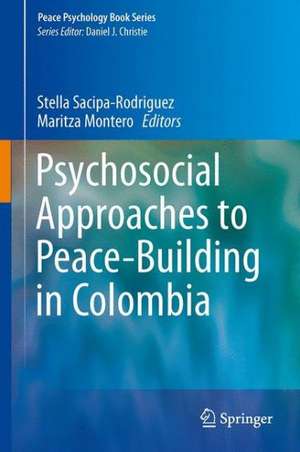Psychosocial Approaches to Peace-Building in Colombia: Peace Psychology Book Series, cartea 25
Editat de Stella Sacipa-Rodriguez, Maritza Monteroen Limba Engleză Hardback – 7 apr 2014
| Toate formatele și edițiile | Preț | Express |
|---|---|---|
| Paperback (1) | 550.76 lei 38-44 zile | |
| Springer International Publishing – 3 sep 2016 | 550.76 lei 38-44 zile | |
| Hardback (1) | 639.25 lei 22-36 zile | |
| Springer International Publishing – 7 apr 2014 | 639.25 lei 22-36 zile |
Din seria Peace Psychology Book Series
- 18%
 Preț: 779.26 lei
Preț: 779.26 lei -
 Preț: 361.05 lei
Preț: 361.05 lei - 18%
 Preț: 788.54 lei
Preț: 788.54 lei - 15%
 Preț: 699.28 lei
Preț: 699.28 lei - 15%
 Preț: 646.62 lei
Preț: 646.62 lei - 18%
 Preț: 1690.13 lei
Preț: 1690.13 lei - 15%
 Preț: 645.28 lei
Preț: 645.28 lei - 24%
 Preț: 1044.84 lei
Preț: 1044.84 lei - 18%
 Preț: 945.14 lei
Preț: 945.14 lei - 15%
 Preț: 649.54 lei
Preț: 649.54 lei -
 Preț: 386.39 lei
Preț: 386.39 lei - 15%
 Preț: 697.82 lei
Preț: 697.82 lei - 15%
 Preț: 591.14 lei
Preț: 591.14 lei - 18%
 Preț: 1222.94 lei
Preț: 1222.94 lei - 15%
 Preț: 644.82 lei
Preț: 644.82 lei - 15%
 Preț: 649.22 lei
Preț: 649.22 lei - 15%
 Preț: 697.65 lei
Preț: 697.65 lei -
 Preț: 388.72 lei
Preț: 388.72 lei - 15%
 Preț: 647.08 lei
Preț: 647.08 lei - 24%
 Preț: 967.02 lei
Preț: 967.02 lei - 15%
 Preț: 638.89 lei
Preț: 638.89 lei - 15%
 Preț: 650.37 lei
Preț: 650.37 lei - 18%
 Preț: 733.15 lei
Preț: 733.15 lei -
 Preț: 398.74 lei
Preț: 398.74 lei - 15%
 Preț: 644.30 lei
Preț: 644.30 lei - 18%
 Preț: 1116.57 lei
Preț: 1116.57 lei -
 Preț: 365.05 lei
Preț: 365.05 lei - 15%
 Preț: 643.99 lei
Preț: 643.99 lei - 18%
 Preț: 1116.26 lei
Preț: 1116.26 lei - 18%
 Preț: 1381.26 lei
Preț: 1381.26 lei - 18%
 Preț: 1595.75 lei
Preț: 1595.75 lei - 18%
 Preț: 779.89 lei
Preț: 779.89 lei
Preț: 639.25 lei
Preț vechi: 752.06 lei
-15% Nou
Puncte Express: 959
Preț estimativ în valută:
122.32€ • 128.05$ • 101.21£
122.32€ • 128.05$ • 101.21£
Carte disponibilă
Livrare economică 17-31 martie
Preluare comenzi: 021 569.72.76
Specificații
ISBN-13: 9783319045481
ISBN-10: 3319045482
Pagini: 180
Ilustrații: XXI, 155 p. 2 illus.
Dimensiuni: 155 x 235 x 15 mm
Greutate: 0.39 kg
Ediția:2014
Editura: Springer International Publishing
Colecția Springer
Seria Peace Psychology Book Series
Locul publicării:Cham, Switzerland
ISBN-10: 3319045482
Pagini: 180
Ilustrații: XXI, 155 p. 2 illus.
Dimensiuni: 155 x 235 x 15 mm
Greutate: 0.39 kg
Ediția:2014
Editura: Springer International Publishing
Colecția Springer
Seria Peace Psychology Book Series
Locul publicării:Cham, Switzerland
Public țintă
ResearchCuprins
Part I: Background.- Introduction: The Beginnings.- Historical Data about the Colombian Strife.- Part II: Peace-Building in Colombia.- Peace Cultures and Cultural Practices in Colombia.- Reflections on Psychological Damage of People Exposed to War Situations in Colombia.- To feel and to resignify forced displacement in Colombia.- Personal Resources and Empowerment in a Psychosocial Accompaniment Process.- Memory, narrative and social transformation of reality.- Discourse as strategy for the construction of peace cultures.- Genderization and links with illegal armed groups in Colombia.- Eight cultures of peace indicators applied to Colombian Conflict during 2002-2006.
Notă biografică
Stella Sacipa-Rodríguez is a Psychologist (Universidad Nacional de Colombia, 1971) with a Masters degree in Communication (Pontifical Javeriana University, 1995). Her master thesis was on 'Meanings constructed by a political organization' (M-19) received the Award of Merit. For 14 years she has researched in the fields of Peace Psychology and psychosocial accompaniment to people and communities affected by socio-political violence in Colombia. She is the co-founder of the research group Social Bonds and Peace Cultures, and its leader for 10 years. She has trained professional psychologists and psychology students support to victims of war. She has studied, written and lectured about political psychology, psychosocial accompaniment to victims of armed conflict, meanings of peace and cultures of peace, in Colombia. Currently, she is a professor of Peace Psychology at the Pontifical Javeriana University.
Maritza Montero is a social psychologist and holds a Ph.D. in sociology. She currently teaches at Universidad Central de Venezuela Doctorate Program and has lectured extensively in the Americas, Europe and Australia. She is on the editorial boards of several national and international community and social psychology journals, and is an associate senior editor of the American Journal of Community Psychology. She has won several national and international scientific awards among which the Interamerican Society of Psychology (1995) and the Venezuelan National Science Award (2000). Maritza has served as the president of the International Society of Political Psychology (2006) and as the vice president for South America of the Interamerican Psychology Society (1997–1999). She has contributed several books and numerous papers and book chapters published in Spanish, English, Portuguese and French. She has been a member of the International Committee for the Liberation Psychology Conferences and her 2007 production includes books published inArgentina, Chile, Costa Rica, and USA.
is a social psychologist and holds a Ph.D. in sociology. She currently teaches at Universidad Central de Venezuela Doctorate Program and has lectured extensively in the Americas, Europe and Australia. She is on the editorial boards of several national and international community and social psychology journals and is an associate senior editor of the American Journal of Community Psychology. She has won several national and international scientific awards among which the Interamerican Society of Psychology (1995), and the Venezuelan National Science Award (2000). Maritza has served as the president of the International Society of Political Psychology (2006), and as the vice president for South America of the Interamerican Psychology Society (1997–1999). She has contributed several books and numerous papers and book chapters published in Spanish, English, Portuguese, and French. She has been a member of the International Committee for the Liberation Psychology Conferences and her 2007 production includes books published in Argentina, Chile, Costa Rica, and USA.
Maritza Montero is a social psychologist and holds a Ph.D. in sociology. She currently teaches at Universidad Central de Venezuela Doctorate Program and has lectured extensively in the Americas, Europe and Australia. She is on the editorial boards of several national and international community and social psychology journals, and is an associate senior editor of the American Journal of Community Psychology. She has won several national and international scientific awards among which the Interamerican Society of Psychology (1995) and the Venezuelan National Science Award (2000). Maritza has served as the president of the International Society of Political Psychology (2006) and as the vice president for South America of the Interamerican Psychology Society (1997–1999). She has contributed several books and numerous papers and book chapters published in Spanish, English, Portuguese and French. She has been a member of the International Committee for the Liberation Psychology Conferences and her 2007 production includes books published inArgentina, Chile, Costa Rica, and USA.
is a social psychologist and holds a Ph.D. in sociology. She currently teaches at Universidad Central de Venezuela Doctorate Program and has lectured extensively in the Americas, Europe and Australia. She is on the editorial boards of several national and international community and social psychology journals and is an associate senior editor of the American Journal of Community Psychology. She has won several national and international scientific awards among which the Interamerican Society of Psychology (1995), and the Venezuelan National Science Award (2000). Maritza has served as the president of the International Society of Political Psychology (2006), and as the vice president for South America of the Interamerican Psychology Society (1997–1999). She has contributed several books and numerous papers and book chapters published in Spanish, English, Portuguese, and French. She has been a member of the International Committee for the Liberation Psychology Conferences and her 2007 production includes books published in Argentina, Chile, Costa Rica, and USA.
Textul de pe ultima copertă
This edited volume summarizes and expands upon the important work of a research group, Social Bonds and Cultures of Peace, that accompanies and supports victims of socio-political violence in Columbia. Grounding the volume is an introductory overview of Colombian political violence in the recent past, as well as an exploration of the role of peace psychology in conflict situations and in the broader content of the field of psychology. The following chapters, written by active peace psychologists and researchers based in Colombia, focus on ongoing violence in the Colombian context, a complex and dynamic area in which various groups (drug traffickers, national armed forces, guerrilla fighters, self-defence groups) have been engaged in organized violence for more than 60 years.
Psychosocial Approaches to Peace-Building in Colombia explores the psychological dynamics of both the victims and perpetrators of conflict. Central to the volume is the notion of "accompanying" those who have been victims of violence, listening to them, engaging them in dialogue, and working together to strengthen the resources of victims. The recovery of individual and collective memories of atrocities is discussed as an important avenue for healing and for the empowerment of individuals and groups. The solidarity among victims creates opportunities at the grassroots level to pursue truth, reveal perpetrators of violence, seek public acknowledgment and attain social justice. For perpetrators of violence and members of armed groups, the book addresses a host of psychosocial issues related to disarming, demobilizing and reintegrating former combatants, including children, into society.
Throughout the book, in the spirit of peace psychology, the researchers are engaged in a form of praxis that is cognizant of the wider geohistorical context within which victims and perpetrators are embedded and the dialectical relationship between micro and macro-levelevents and change. This volume is an excellent resource for researchers and scholars in Latin American studies, peace psychology, social and clinical psychology, social justice, and transitional justice, and all those committed to ending and healing from conflict situations around the world.
Psychosocial Approaches to Peace-Building in Colombia explores the psychological dynamics of both the victims and perpetrators of conflict. Central to the volume is the notion of "accompanying" those who have been victims of violence, listening to them, engaging them in dialogue, and working together to strengthen the resources of victims. The recovery of individual and collective memories of atrocities is discussed as an important avenue for healing and for the empowerment of individuals and groups. The solidarity among victims creates opportunities at the grassroots level to pursue truth, reveal perpetrators of violence, seek public acknowledgment and attain social justice. For perpetrators of violence and members of armed groups, the book addresses a host of psychosocial issues related to disarming, demobilizing and reintegrating former combatants, including children, into society.
Throughout the book, in the spirit of peace psychology, the researchers are engaged in a form of praxis that is cognizant of the wider geohistorical context within which victims and perpetrators are embedded and the dialectical relationship between micro and macro-levelevents and change. This volume is an excellent resource for researchers and scholars in Latin American studies, peace psychology, social and clinical psychology, social justice, and transitional justice, and all those committed to ending and healing from conflict situations around the world.
Caracteristici
Describes, analyses and critically discusses the psychological effects of armed conflict in Colombia Explores the results of Colombian research action group Social Bonds and Cultures of Peace Includes a chapter linking the historical background of the Colombian conflict to the current situation Written by active psychologists based in Colombia Includes supplementary material: sn.pub/extras














